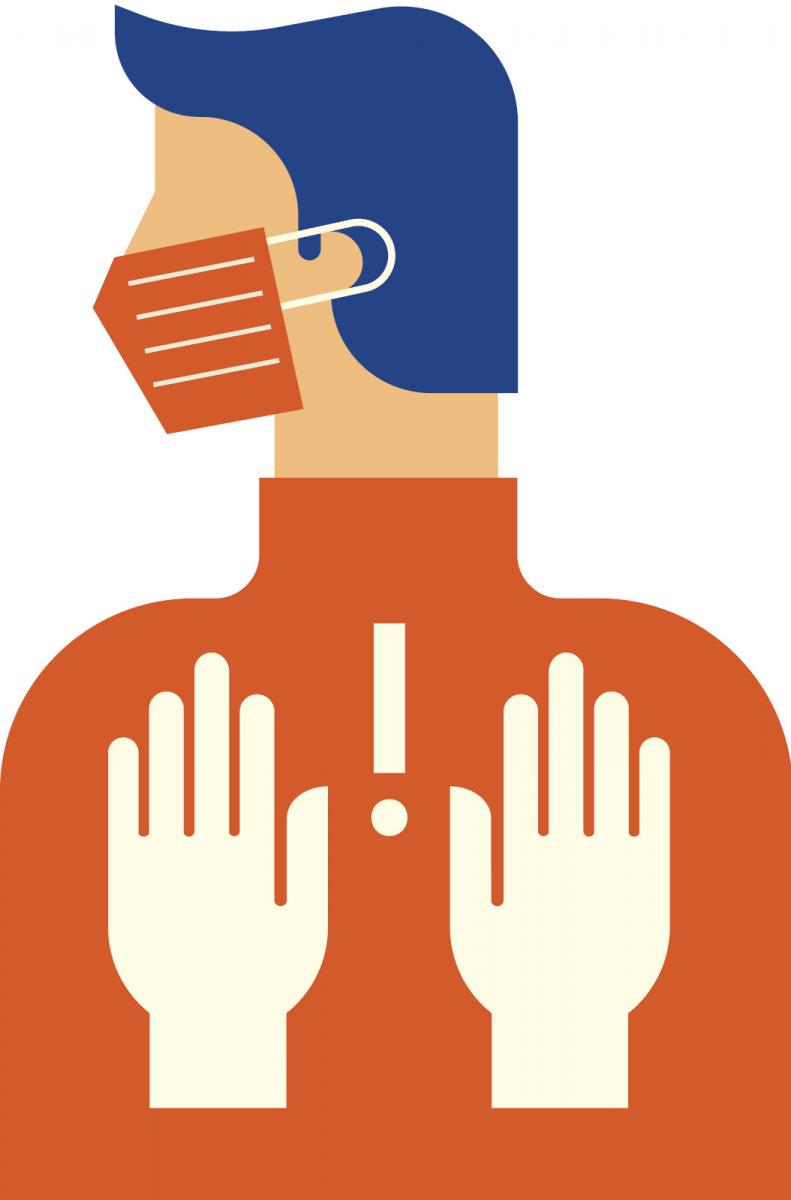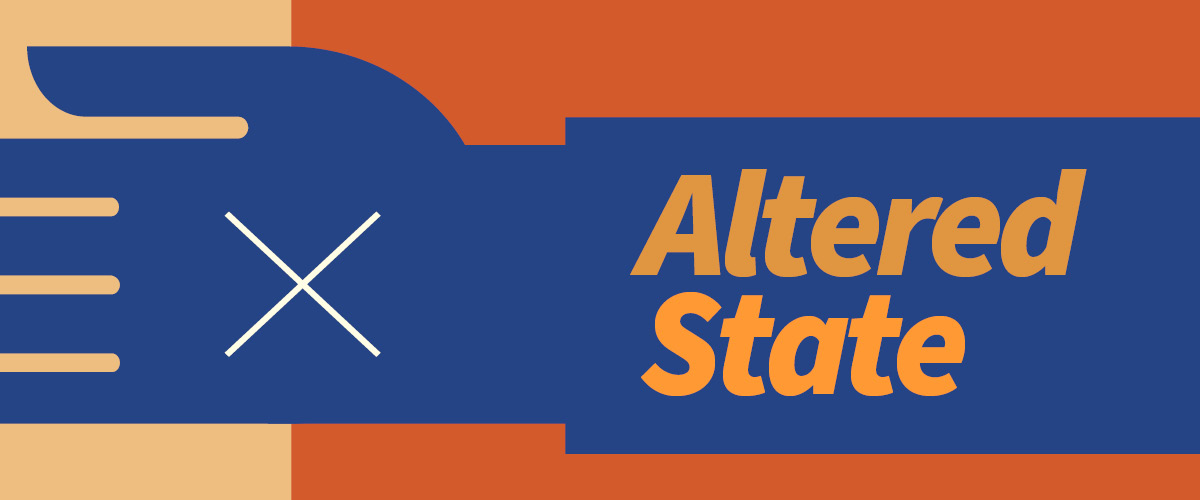In ways big and small, SF State adapted and innovated to meet the challenge posed by Covid-19
Physical distancing might have been keeping us apart, but that didn’t stop the San Francisco State University community from pulling together. The University’s students, faculty and staff found numerous ways to help during the COVID-19 pandemic. Whether donating — or producing — much-needed medical supplies, supporting those sheltering in place on campus or raising money for students most challenged by the crisis, they were meeting extraordinary needs with decisive action.
Sending supplies to the front lines
Health care facilities across the U.S. are experiencing a shortage of medical supplies, and Bay Area hospitals haven’t been immune. In response, the University’s College of Science and Engineering donated roughly 35,000 gloves, 350 pairs of protective eyewear and a couple hundred lab coats to nearby medical facilities, including Seton Medical Center and University of California, San Francisco Medical Center. Instead of sitting idle in storerooms, the much-needed supplies were on the front line of the fight against COVID-19.
Demand was also high for another piece of equipment vital to medical personnel in the age of COVID-19: plastic face shields. Though they were hard to find this spring, they’re not impossible to make — provided you have the schematics, the right equipment and a can-do attitude. Students from the School of Engineering and the Department of Computer Science took home four state-of-the-art 3D printers from the student-led Rapid Prototyping Lab and used them to create their own small-scale face shield factory. They donated the face shields they created, along with straps and other equipment, to Bay Area hospitals.
Fighting fear with knowledge
Unfortunately, the pandemic resulted in shortages of other things — including, at times, clear thinking. On the other hand, shoddy science thrived, reports SF State Assistant Professor of Biology Pleuni Pennings.
The rapid spread of SARS-CoV-2, the virus that causes COVID-19, sparked a flurry of new research and sometimes questionable scientific punditry around the world. For Pennings, who studies the genetics and evolution of HIV, setting the record straight is just part of the job. Recently, in an article for the science news website LiveScience, she debunked a study claiming that the novel coronavirus may have hopped to humans from dogs. She also provided educational context early in the pandemic, when scientists saw evidence that the virus was spreading in the state of Washington. Their conclusion was based on some complex genetics, so Pennings sprang into action and made a video (available at vimeo.com/395051566) explaining the genetic evidence in easy-to-understand terms. Later she created another explanatory video (at vimeo.com/400477097) with two colleagues. She was then tapped for her expertise on the genetics and evolution of viruses in the New York Times and spoke with WIRED Magazine about how researchers can responsibly speak about the virus.
“I think the more background you have, the faster you can parse the information — and also see when there is maybe some nonsense,” she says.
Staying connected to the most vulnerable
Meanwhile, experts at SF State’s Paul K. Longmore Institute on Disability leveraged the stay-at-home order to spread programming for and about disability culture to a broad audience. As experts in online accessibility, they quickly offered an array of online content, including an online-only version of their annual disability film festival Superfest. The institute has also aided other organizations, including Seattle’s transgender film festival and the Jewish Film Festival, as they attempted to move disability-related content online.
Given the dangers of COVID-19 to specific groups, says Longmore Institute Associate Director Emily Beitiks, the institute’s outreach efforts are more important than ever. “There’s a lot at stake for people with disabilities, especially black and brown disabled people,” Beitiks said. “It’s a population with higher risks of fatalities from the coronavirus.”
Many more stories about the University’s ongoing response to the COVID-19 pandemic can be found online at news.sfsu.edu.
Medicine for a Sickness of the Mind

As the COVID-19 virus spread across the globe, Asian American Studies Professor and Chair Russell Jeung was busy tracking a different corrosive contagion: xenophobia. Early on he noticed a sharp rise in media reports about coronavirus-related racism, a finding he highlighted in reports sent to California civil rights groups. As a result, some of those groups are now working with the Asian American Studies Department to track — and hopefully help stop — pandemic-inspired harassment.
In one recent study, Jeung and two collaborators surveyed American news reports between Feb. 7 and March 9 and found a 50% increase in the number of articles about discrimination related to the COVID-19 pandemic. In that first week, there were 93 stories. By the fourth week the number ballooned to 140 articles.
The College of Ethnic Studies has this legacy of working with community partners to try to effect social change.
The details in Jeung’s reports prompted California leaders to take action. In March, SF State, the Asian Pacific Planning and Policy Council (A3PCON) and Chinese for Affirmative Action (CAA) launched the Stop AAPI Hate Center. The online database allows people to report harassment, shunning, bullying and other racially motivated attacks and assaults they witness or experience firsthand.
Another initiative proposed by Jeung — a statewide anti-racism ad campaign — has been funded by policy groups. The campaign will likely target social media, grocery stores and mass transit.
Though he’s been alarmed by the spike in anti-Asian discrimination, Jeung is impressed by the swift action to combat it. “This is a good example of community-engaged research that has policy impact,” he says. “The College of Ethnic Studies has this legacy of working with community partners to try to effect social change. This is just another example of how we work with students and the community to really empower the most marginalized in our society.”
HOPE in a Time of Crisis
The Help, Opportunity and Pathway to Empowerment (HOPE) Crisis Fund provides SF State students who are experiencing a crisis beyond their control with emergency funds that meet their immediate needs and allow them to continue their studies and graduate. So when the COVID-19 crisis began disrupting American life this spring, HOPE applications skyrocketed.
“Many students have lost their jobs, and they’re trying to figure out what they will do for rent, because they’re living paycheck to paycheck, and now they have no paycheck,” says Interim Associate Dean of Students Pam Su.
In response, the University launched a campaign to boost funds for the HOPE Crisis Fund and serve more students in need. Thanks to a $100,000 gift from alumna Neda Nobari (B.S., ’84), $50,000 from the San Francisco State University Foundation and more than $70,000 from hundreds of individual donors, the campaign raised more than $200,000 within weeks. Unfortunately, that still wasn’t enough to meet the demand: As of early April, the fund had received requests for aid totaling over $792,000.
“We are so grateful to the Foundation, Neda and the community for supporting our students,” says SF State Executive Director of Development & Campaign Operations Manny Nungaray. “We are hoping that the philanthropic community will continue to help the University meet the needs of the hundreds of students who have applied to the HOPE Crisis Fund for emergency funding.”
“The HOPE Crisis Fund is the best hope I could have received to ensure that I finish what I started and finish this semester with a win,” says Juthaporn Chaloeicheep, a senior who recently applied for — and received — emergency support. “It shows that there are others who believe in my dream and will not let money be the reason I could not pursue it.”
Learn more at develop.sfsu.edu/hope-fund.
